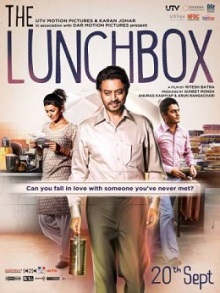
This modestly produced Indian film has been making waves all over the world. It’s been a commercial and a critical success both for domestic audiences in India and in foreign markets. I think this is because it feels very authentically Indian, yet at the same time it tells the kind of timeless, universal story that Hollywood excels at, making it a film that travels exceptionally well.
For the outsider, what immediately captures your attention is the film’s portrayal of the dabbawala lunch delivery network in Mumbai. Workers collect the hundreds of thousands of tiffins one by one from houses and restaurants and transport them on bicycles and trains to offices all across the city. That such a low-tech and seemingly rickety system could work reliably almost beggars belief but apparently it’s real and errors are rare.
It is one such improbable error which connects our protagonists Saajan and Ila in this film. The former is a widower nearing retirement. The latter is a housewife with an indifferent husband and a single daughter. Both are in their own ways lonely in the middle of densely populated Mumbai. When Ila attempts to attract the attention of her husband with a carefully prepared lunch, the tiffin instead finds its way to Saajan who shows his appreciation by returning it completely empty. The two then begins a long distance friendship by exchanging notes through the dabbawalas.
That this film just oozes with charm is undeniable. Part of this is the sheer anachronism, and therefore romanticism, of exchanging handwritten notes in the age of e-mail and SMS. Another part is how it deftly captures flashes of day-to-day life in urban India: Ila conversing and exchanging groceries with her unseen upstairs neighbour, the daily routines of office workers as they travel to and from work, what they have for lunch and how they eat it and so forth. I think it’s significant that while director Ritesh Batra was born and raised in India, he was trained in the US. The scenes are at once exotic and yet completely familiar and accessible.
What I don’t like is that it doesn’t quite stand up as a romantic film, yet this is clearly the angle that is being pushed despite the ambiguous ending. There seems to be too much of an age gap between the two to make it work and surely Ila wouldn’t go so far as to abandon her daughter? I can sympathize with the two being lonely and wanting to connect as friends and companions, with romance as only the subtext. But anything more than that feels too blatant and implausible. Think about Lost in Translation and how the subtlety of the relationship there worked to its advantage.
The Lunchbox is quite an impressive film by a début director and I thoroughly recommend it to everyone. But I also think that it is still an immature film. I look forward to watching the development of this director’s career.